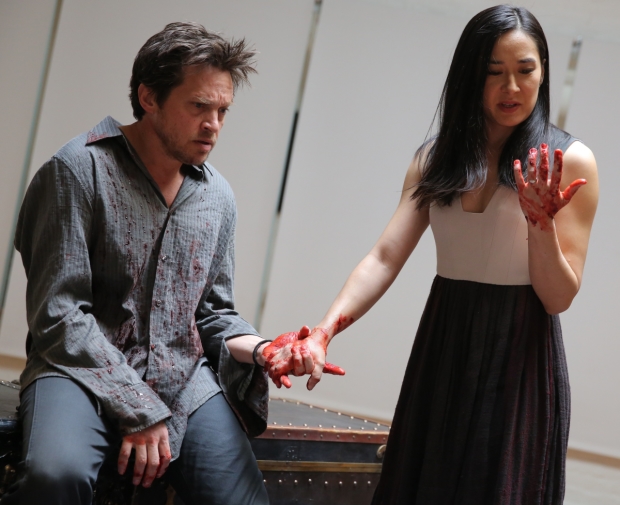Macbeth

(© Joan Marcus)
For all its scenes of supernatural mischief and its potential for spooky theatrical special effects and gore, Macbeth, at its bloody heart, is a play that relies on the incantatory power of language. The small, brilliant group that makes up the Public Theater's Mobile Shakespeare Unit gets this aspect of Macbeth completely, and it has assembled a trim and muscular version that proves Shakespeare's words are the only special effect needed.
In the spirit of Public founder Joseph Papp, who believed that Shakespeare belongs to everyone, the Mobile troupe brings its productions (Pericles was featured earlier this year) to prisons, homeless shelters, and other venues throughout New York City so that folks who might not have access to theater can see a Shakespearean classic. The text for this staging has been put on the treadmill and slimmed down to a fit 100 minutes, without detriment to the story (no one, for example, will miss a passing mention of the Swedish king, Sweno). That said, the Mobile's production, now running at the Public's Shiva Theater will satisfy seasoned Shakespeare fans, as well as make an exciting introduction for Bard rookies.
On a simple set comprising a square graffiti-strewn mat and three trunks (scenic design by Wilson Chin), Rob Campbell portrays a mercurial Macbeth, who, fresh from a victorious battle, is greeted by three witches (Jennifer Ikeda, Nicole Lewis, and Teresa Avia Lim) clothed in modern biker-style garb (costumes by Amanda Seymour). They foretell that Macbeth will become king of Scotland and that his colleague Banquo (Keith Eric Chappelle) will be father to kings. Macbeth's ambitious wife (Ikeda) goads him into murdering King Duncan (Daniel Pearce) to speed things along, but one murder begets the next as Macbeth and his Lady's feverish desire for power leads them down dark paths of guilt and madness, until Duncan's son, Malcolm (James Udom) and others gather forces to overthrow the once-respected man who became a tyrant.
Edward Torres' direction keeps the action moving at a sprinter's pace, and Campbell in the lead role ably holds the course, taking a moment now and then to glare into the eyes of an audience member as his Macbeth transforms from honorable warrior to pernicious tyrant. Ikeda offers a Lady Macbeth whose seemingly once-good soul is crushed by the weight of ambition; at the moment she calls upon the dark gods to "unsex" her, we see the face of Ikeda's Lady M. clenched as she suppresses her last impulse of compassion and turns herself over to avarice. Also noteworthy is Pearce, who, in addition to Duncan, gives a moving portrayal as Macduff, particularly in the moment when he learns that Macbeth has slaughtered his family.
But Torres instinctively slows the action in iconic spots like Macbeth's dagger scene and the "Tomorrow" speech to allow the audience to soak in the words. Unfortunately this instinct did not extend to the music (composed by Michael Thurber and played by the actors), which is sometimes played so loudly that it's difficult to hear the dialogue.
That aside, this smart, intensely performed, intermission-free production flexes its muscles like a well-toned athlete, letting Shakespeare's language do the heavy lifting.











